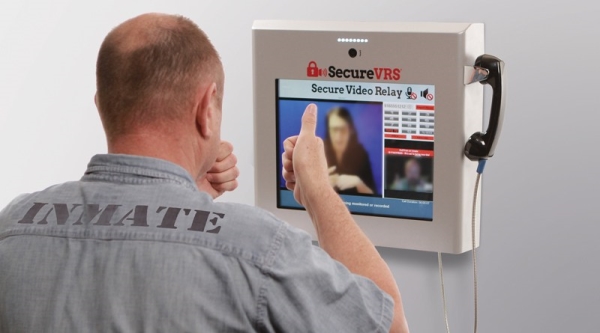
Settlement agreement approved on the 28th anniversary of the ADA
Chicago—(ENEWSPF)–July 25, 2018
Contacts: Alan Mills, Uptown People’s Law Center, Barry Taylor, Equip for Equality, Jill Shea, Winston & Strawn LLP, and Howard A. Rosenblum, National Association of the Deaf
Today, a federal judge approved a groundbreaking settlement has been reached in a class action that will fundamentally improve the lives of Illinois prisoners who are deaf and hard of hearing. The class action was filed May 4, 2011 and alleged, among other things, that the Illinois Department of Corrections (IDOC) systematically failed to provide American Sign Language interpreters and other alternate forms of communication. Without these accommodations, deaf and hard of hearing prisoners have been endangered and deprived of meaningful access to religious services, healthcare, educational and vocational programs, telephones, televisions, library services, disciplinary proceedings, grievances, and pre-release programs.
A fairness hearing, in which a judge must find that a class action settlement is fair, reasonable and adequate, will be held in Chicago tomorrow, July 26 at 10:30 before the Honorable Judge Marvin E. Aspen, 219 S. Dearborn Street, Courtroom 2568.
The lawsuit was filed by the law firm Winston & Strawn LLP, serving as lead counsel and providing representation on a pro bono basis; two Illinois non-profit legal advocacy organizations, Equip for Equality and Uptown People’s Law Center; and the National Association of the Deaf.
Terms under the far-reaching settlement include:
- Hearing Tests: IDOC will provide enhanced screening to identify which prisoners are deaf and hard of hearing.
- Communication Specialists: IDOC will use specialists to test the communication skills of deaf and hard of hearing prisoners, identify necessary accommodations and develop a communication plan.
- Hearing Aids: IDOC will provide hearing aids when recommended by an audiologist and provide timely replacement batteries and repairs.
- Sign Language Interpreters: For prisoners who communicate in American Sign Language (ASL), IDOC will provide sign language interpreters for important programs.
- Video Phones, TTYs, and Amplified Phones: Every Illinois prison with a deaf or hard of hearing prisoner must have at least one videophone, two TTYs, and two amplified telephones.
- Communication Alerts: Every Illinois prison that has a deaf or hard of hearing prisoner must have a safe way to provide accessible notifications about fires, emergencies, evacuations, meals, showers, yard time, doctor or counselor appointments, and visitors.
- VRI: Illinois prisons must provide Video Remote Interpreting (VRI) for doctor appointments when no sign language interpreter can come to the prison for doctor appointments.
“It is fitting that the fairness hearing will take place on the anniversary of the passage of the Americans with Disabilities Act,” said Barry C. Taylor, vice president for Civil Rights and Systemic Litigation, Equip for Equality. “One of the tenets of the ADA is to provide effective communication for people with disabilities. This settlement agreement will go a long way to ensure that the ADA’s promise becomes a reality for deaf and hard of hearing prisoners.”
“Our goal in this case was to ensure that significant steps would be taken within IDOC to enable deaf and hard of hearing prisoners in Illinois to communicate effectively while in IDOC custody,” said Robert Michels, a partner with Winston & Strawn. “Allowing deaf and hard of hearing prisoners to communicate effectively is critically important for a variety of reasons, including so that they are safe, they are able receive proper medical care, they are able to participate in the programs and services available to them while in custody, and they are not treated unfairly as a result of their hearing impairment. We are glad that this settlement today allows substantial improvements to be made within IDOC that, if properly implemented, should result in achieving our goal.”
“Being in prison is an awful experience for anyone; being in prison when you can’t hear is terrifying. This settlement, when fully implemented, ensures that no one will ever be left alone in silence in Illinois prisons. These changes are vital—the Americans with Disabilities Act applies to everyone in the United States, including people in prison,” said Alan Mills, executive director of Uptown People’s Law Center.
“On the 28th anniversary of the ADA and 45 years after passage of the Rehabilitation Act, this fairness hearing is one step closer to ensuring that deaf and hard of hearing people in Illinois prisons have equal rights, particularly for communication and telecommunication purposes,” said Howard A., Rosenblum, CEO of the National Association of the Deaf. “Although such basic rights are overdue, there should be no further delay to ensuring that deaf and hard of hearing prisoners have equal access to calling their families and lawyers, and to being able to communicate with prison staff for all programs and services.”
Organizations representing the plaintiffs:
Winston & Strawn LLP is an international law firm with nearly 1,000 attorneys among 16 offices across North America, Europe, the Middle East, and Asia. Formed in 1853, the firm not only represents Fortune 500 companies and other clients on major business-related matters, it also has a strong commitment to providing pro bono representation, including in matters involving civil rights, community economic development, criminal defense, First Amendment/free speech, contested guardianship, landlord/tenant, not-for-profit corporate organization, political asylum, post-conviction relief in death penalty cases, and public assistance.
Equip for Equality is a private, not-for-profit entity designated in 1985 by the Governor of Illinois to administer the federally mandated protection and advocacy system for safeguarding the rights of people with physical and mental disabilities in Illinois.
Uptown People’s Law Center is a nonprofit legal services organization specializing in prisoners’ rights, Social Security disability, and tenants’ rights and eviction defense. UPLC currently has seven class action lawsuits regarding jail and prison conditions.
National Association of the Deaf, established in 1880, is the nation’s premier organization safeguarding the civil, human and linguistics rights of deaf and hard of hearing individuals in the USA.
Source: Uptown People’s Law Center








